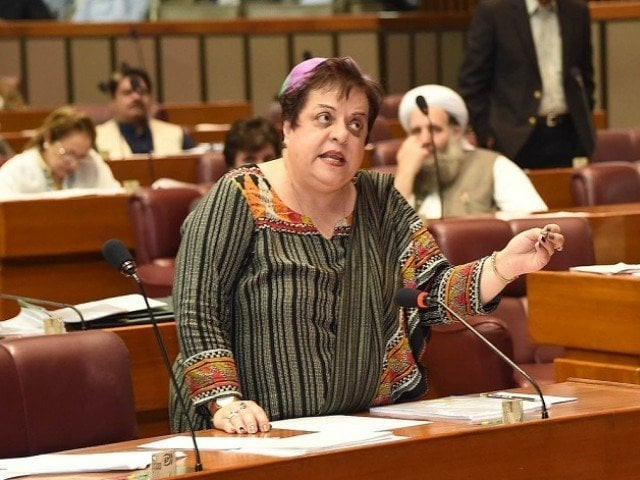US playing ‘Xinjiang Card’ against China, silent on Kashmir and Palestine: Mazari
Pakistan will continue to support China on its core national interests, says Senator Mushahid Hussain

Federal Minister for Human Rights Dr Shireen Mazari said on Thursday that the United States was involved in starting a new Cold War with China by playing the ‘Xinjiang Card’ in the midst of the Covid-19 pandemic while questioning its conspicuous silence on Kashmir and Palestine issues.
The human rights minister said that the US was trying to militarize global politics as well as economics, whereas China strives to share economic prosperity and open up the world through trade routes and infrastructure in Pakistan and African countries so that all countries can prosper via international trade.
“The rational route is to support the opening up of the world through international trade via the Silk Route, BRI and CPEC project,” Mazari said while explaining that Pakistan faces a challenge of whether it will move towards economic prosperity, which is now a central norm of Pakistan’s National Security policy, or whether it will be sucked into the militarization being pushed by US.
Mazari asserted that US has created laws, such as the Uyghur Forced Labor Prevention Act, to sanction China using the ‘Xinjiang card’. While emphasizing that the US is losing power internationally due to its imperialist approach, Mazari said Muslims have suffered the consequences of the US War on Terror and of militarization and they can’t afford to go down this route.
Mazari shared these views while addressing a webinar organised by the Pakistan-China Institute (PCI) on the New Cold War and playing of Xinjiang card against China under its flagship event series: "Friends of Silk Road (FOSR)".
Other speakers included Senator Mushahid Hussain Sayed, Chairman Senate Defence Committee and PCI, Allama Tahir Ashrafi, Special Assistant to Prime Minister on Religious Affairs, Dr. Ejaz Akram, Chairman Rehmat ul Lil Alameen Authority, Professor Li Xiguang, Director of the Center for Pakistan Cultural and Communication at Tsinghua University, Sabah Aslam, Executive Director of the Islamabad Institute of Conflict Resolution.
Senator Sayed said that Pakistan will continue to support China on its core national interests such as Xinjiang, Taiwan, Tibet, Hong Kong, South China Sea, and BRI as US is engaged in creating cleavages, conflict and encouraging confrontation. The PML-N Senator said that political and economic power in the world was shifting from the West to the East and the US has not been able to compete with China economically.
Sayed highlighted that despite their opposition to the Belt and Road Initiative, the US launched its own copycat project, Built Back Better World. He cited an article by Leslie H. Gelb in The New York Times titled ‘Breaking China Apart’, which stated that the US will ‘kindle separatism in China’ if it doesn’t fall in line and discussed the approach of Demonizing, Damaging and Destabilizing countries.
SAPM Allama Tahir Ashrafi said that bills or statements made by the US regarding lack of religious freedom in Pakistan, China, and Saudi Arabia were baseless, saying the statements were politically motivated. He stressed that the United States should avoid interfering in the internal affairs of other countries and avoid needlessly criticising China on Xinjiang.
Emphasizing that the US should focus on human rights violations in its own country, Ashrafi said the US should rely on facts and engage in dialogue instead of using a narrative of a lack of religious freedom as a political weapon. “The stance of the Pakistani people, government, and religious parties regarding China is that it is Pakistan’s best friend and neighbour, irrespective of American propaganda,” he emphasized.
Dr Akram stated that issue of Xinjiang is a flashpoint, which is used by Western groups to rally certain parts of the Muslim world against China. Emphasizing that Pakistan was in a twilight zone between US and China, Akram advised the government to support China in its quest for truth, of protecting its interests and in protecting the region.
Professor Xinguang discussed that the West fears the unity between the Confucian and Islamic Civilizations. He highlighted that the West’s purpose to play the ‘Xinjiang card’ was to divide and undermine China and create misunderstandings between China and neighbouring Muslim countries, as well as those along the Belt and Road.
“The West wants to turn Xinjiang into another Afghanistan,” the professor said while stressing that China respects the culture and religion of the Afghan people, unlike the US, which despite failing in the battlefield does not want to see unity among Afghans.
Ms Saba discussed that in international politics, the Western world, which has a colonial mindset, uses narratives and sanctions to demonize others. She stressed that the US always imposes unilateral sanctions, which is seen as a more effective tool. She predicted that China and US won’t engage in military conflict since they will fight on an economic level.
The Executive Director of PCI Mustafa Hyder Sayed emphasized that Pakistan should continue to support China on Xinjiang since China has always supported Pakistan on its core interests.



















COMMENTS
Comments are moderated and generally will be posted if they are on-topic and not abusive.
For more information, please see our Comments FAQ